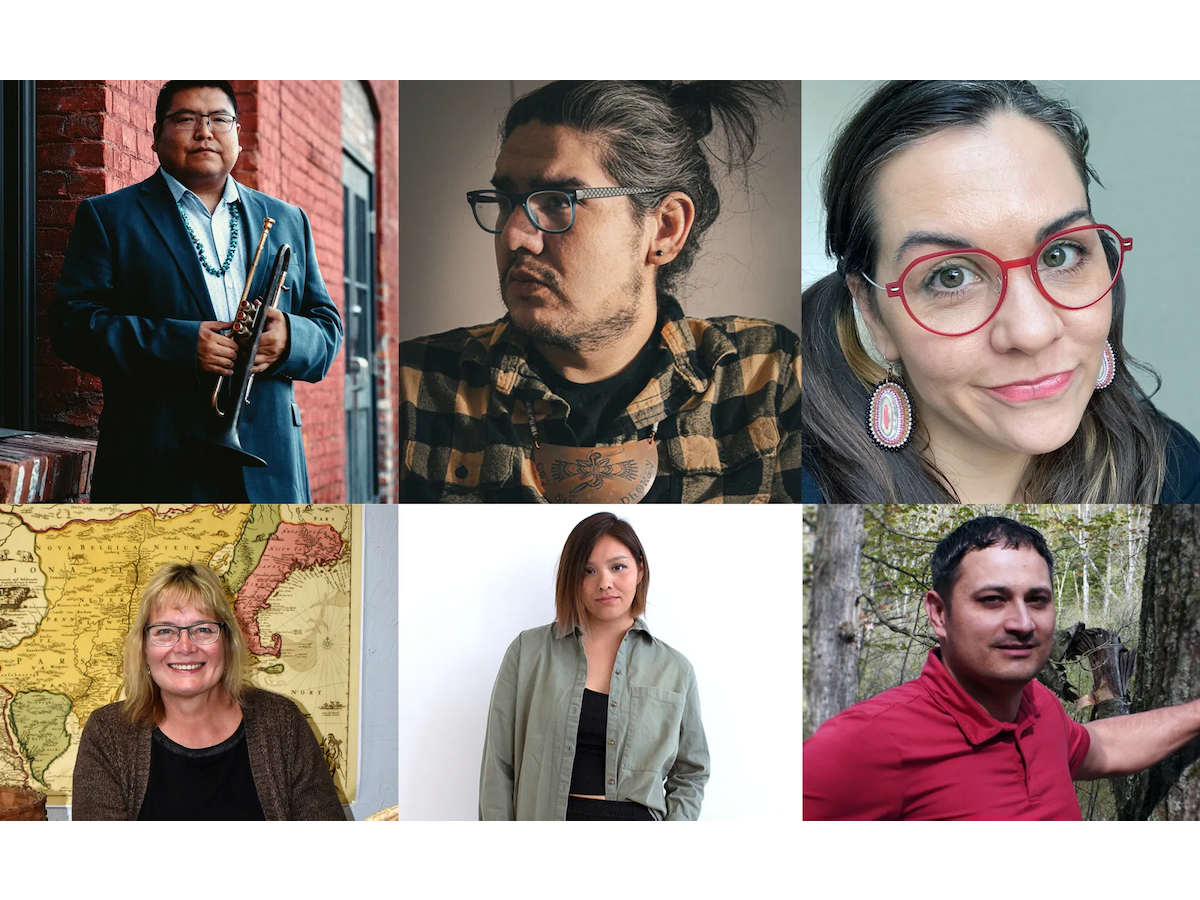
[ad_1]

The Native-led arts and culture advocacy organization Forge Project announced its 2024 fellowship cohort today, May 15, comprising six artists, musicians, filmmakers, and advocates.
Reflecting a diversity of art disciplines, cultural backgrounds, and geographic upbringings, the fellows are Delbert Anderson (Navajo/Diné), Schon Matthew Duncan (United Keetoowah Band of the Cherokee Indians), Donna Hogerhuis (Stockbridge-Munsee), Lindsay McIntyre (Inuit), Mikayla Patton (Oglala Sioux Lakota), and Sterling Anthony Schreiber II (Stockbridge-Munsee). Each will receive a $25,000 grant to support their practices, as well as embark on a three-week stay this summer at Forge’s 60-acre property in the Mahicannituck (Hudson River) Valley, located approximately 115 miles north of New York City.
The announcement of this year’s fellowship cohort comes during a significant transitional period for the Forge Project. In late April, the four-year-old organization shifted to a 501(c)(3) nonprofit status and has been further developing its Native-led framework through the establishment of a seven-member Indigenous Steering Council, which will guide Forge’s major initiatives and future trajectory. The council members, who include artists Sky Hopinka (Ho-Chunk/Pechanga Band of Luiseño Indians) and Jeffrey Gibson (Choctaw and Cherokee), will oversee Forge’s board of directors and that the organization will continue to fulfill its commitment to Indigenous self-determination. It has also laid out three areas of focus for the years ahead: land, language, and sovereignty.
“A large amount of our funding was coming from our co-founder Becky Gochman through incredible generosity and we thought, ‘How can an organization like this also be really centered on the radical potential of the redistribution of wealth?’” Forge Executive Director and Chief Curator Candice Hopkins (Carcross/Tagish First Nation) told Hyperallergic.
“Especially in the Hudson Valley, the wealth is really not held in Native hands because of forced removal, but that’s the same story for much of the United States because our lands have been seen as sites of extraction, removal, ecocide, and genocide,” Hopkins explained.

In the same vein, Forge also created “a multi-year memorandum of understanding” with the Stockbridge-Munsee Community in order to better address local concerns around cultural accessibility, wealth distribution, historical narrative sovereignty, and ancestral land relations. Hopkins said that this memorandum was crucial in helping Forge “move away from what can seem like performative statements into diplomatic relations based on shared values.”
“There’s a real lack of investment in not only Native-led organizations, but Native-serving organizations in the United States,” Hopkins said.
In addition to these announcements, Forge Project will be debuting a new short film by the self-described “public secret society” New Red Order (NRO) next week on May 23. Aptly titled “Forge Reciprocal Relations” (2024), the work focuses on decolonizing institutional wealth and promoting Indigenous self-determination and agency — concepts embedded in the Forge Project’s own recent shift.

The screening will be followed by an interactive discussion led by Forge Director of Indigenous Programs and Relationality Sarah Biscarra Dilley (yaktitʸutitʸu yaktiłhini) with NRO filmmaker Adam Khalil (Ojibway) and Halo Kaya Perez-Gallardo, chef and co-founder of Hudson’s pan-Latin restaurant Lil’ Deb’s Oasis.
Read on to learn more about the six individuals who will be participating in Forge’s 2024 fellowship cohort:
Delbert Anderson (Navajo/Diné)
A jazz trumpet player, composer, and youth educator, Anderson fuses traditional Navajo “spinning songs” with modern jazz and funk music to create a one-of-a-kind sound. Head of the Delbert Anderson Quartet, he also leads a “Build A Band” program that focuses on teaching jazz improvisation to youth musicians with a focus on Diné cultural values.
Schon Matthew Duncan (United Keetoowah Band of the Cherokee Indians)
A filmmaker, educator, and Cherokee language advocate, Duncan told Hyperallergic that they hope to use this fellowship to expand their work in Cherokee language revitalization.
“I want to create media that intermediate learners can watch and participate in and learn from,” Duncan said, explaining how they hope their short films and zines can help fill the “gap” in the Cherokee language curriculum.
“That’s what I’m looking forward to the most — using a lot of this capital to create media that will help learners move further in their language learning journey.”
Donna Hogerhuis (Stockbridge-Munsee)
A descendant of several generations of basket makers, Hogerhuis is currently researching the history of Mohican basketry and northeast Indigenous regional designs. Professionally, she manages the Preservation Program’s Library, Archives, and Repository for a Northwest tribal community, and has spent the last 25 years assisting Native community members with research, publications, and exhibitions focusing on Indigenous culture and history.
Lindsay McIntyre (Inuit)
McIntyre is an experimental filmmaker and documentarian whose practice is largely based in 16mm analog film. Her work largely focuses on themes relating to portraiture, location, and personal storytelling, and at times involves handmade emulsions made from caribou gelatin.
Mikayla Patton (Oglala Sioux Lakota)
An interdisciplinary visual artist, Patton’s sculptures focus on themes of healing, growth, and revitalization, and consist of natural and recycled materials including repurposed paper, porcupine quills, plants, leather, and glass beads.
Sterling Anthony Schreiber II (Stockbridge-Munsee)
A longtime Native food sovereignty advocate, Schreiber operates a produce farm and apiary on the Stockbridge-Munsee Indian Reservation in Wisconsin, where he and his family grow healthy food for local tribal communities. They also collaborate with regional organizations including Feeding America Eastern Wisconsin, the Great Lakes Intertribal Food Coalition, and the Tribal Elder Food Box Program, developing initiatives focused on improving Native food security and increasing education around food accessibility and sovereignty.
Related
[ad_2]